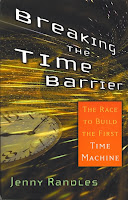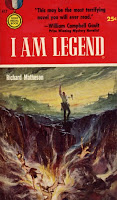It seems like a science fiction setting would be easy to write because you pretty much just get to make a bunch of shit up—as a matter of fact, sci-fi and fantasy often get mushed together since they both incorporate a lot of made-up shitness. That's part of the charm. You get transported to a whole new world, a new way of seeing things, new people and new problems. The ultimate escape fiction.
 But good science fiction is more difficult to create than you might think. Whereas fantasy seems to be backwards-looking, science fiction tends to be forward-looking, so it's a little harder to find reliable research material. To make it even more complicated, I prefer what is called hard sci-fi. This is science fiction that is backed up by fact and theory and focuses on technical detail. These books are usually written by people like Michael Crichton, Isaac Asimov or Arthur C. Clarke. Instead of writing that the sun exploded suddenly and without warning, a hard sci-fi story might discuss the details leading up to the explosion, the particles that were released—or better yet, created—during the explosion and the effect it might have on any landscape or living tissue that survived the initial blast. Some are so detail intensive that by the time you're done with the book, you feel like you've earned an honorary physics degree.
But good science fiction is more difficult to create than you might think. Whereas fantasy seems to be backwards-looking, science fiction tends to be forward-looking, so it's a little harder to find reliable research material. To make it even more complicated, I prefer what is called hard sci-fi. This is science fiction that is backed up by fact and theory and focuses on technical detail. These books are usually written by people like Michael Crichton, Isaac Asimov or Arthur C. Clarke. Instead of writing that the sun exploded suddenly and without warning, a hard sci-fi story might discuss the details leading up to the explosion, the particles that were released—or better yet, created—during the explosion and the effect it might have on any landscape or living tissue that survived the initial blast. Some are so detail intensive that by the time you're done with the book, you feel like you've earned an honorary physics degree.A sci-fi setting can be another planet, a dystopic or utopic Earth, a laboratory or a plain old regular city. But wherever you decide to set your story, it should be convincing.While I was researching A Scribble in the Margins, I read books like How to Build a Time Machine by Paul Davies and Breaking the Time Barrier by Jenny Randles, among others. I also read a book discussing the probability that the water in the oceans came from comets, but I don't remember the name of that book, or why I felt like it would be appropriate research for A Scribble, which had nothing to do with oceans whatsoever. I researched TBI and spinal cord injuries, spent a lot of time creeping on the rooftops of Los Angeles via Google Earth. I looked up restaurant menus, visited the physics department of one university and collaborated with the physics department head at another university. I taped forty colored note cards to my wall and created timelines and character sketches. I drew my main character's apartment so I could keep track of her as she tried to move her sister around. I even traveled to London to find another character's apartment—a character I later deleted. Now that's dedication. Okay, for really real, I was in London anyway, but walked around until I found a place that looked like where my character would live and then I took a picture of it like a creepy person. Later, in an interview with a guy from London, he told me that she would in no way live there so I moved her to a different neighborhood.
The point is that even though the story is set on Earth in contemporary times, I still had to do a lot of research to make it seem convincing. Nothing cheeses me off more than cop-out settings—stuff that doesn't really make sense, where it's obvious the author has only made a half-hearted effort. The only exception is C.S. Lewis' Space Trilogy, which is so much less popular than The Chronicles of Narnia, that you've probably never heard of it before. The books are Out of the Silent Planet, Perelandra and That Hideous Strength, set on Mars, Venus and Earth respectively. I'm a Lewis fan and I loved these books, but it's obvious he hadn't an inkling about space travel.
 On the flip side, there are those authors who go into waaaaaay too much detail about their new and obviously much-loved worlds. Those types of books are annoying too, because unless the whole history of your planet is exactly relevant to what is happening in the story, then it's called backstory. It's to help guide your writing, and it doesn't need to be spelled out for us, thank you very much.
On the flip side, there are those authors who go into waaaaaay too much detail about their new and obviously much-loved worlds. Those types of books are annoying too, because unless the whole history of your planet is exactly relevant to what is happening in the story, then it's called backstory. It's to help guide your writing, and it doesn't need to be spelled out for us, thank you very much.That being said, there are too many good sci-fi worlds to list as great examples, but I'll try anyway. Some of my favorite sci-fi books, movies and TV shows (in no particular order) are as follows:
- Star Trek
- Firefly/Serenity
- Primer
- Fringe
- Dune
- FlashForward
- 1984
- Battlestar Galactica
- 12 Monkeys
- Looper
- The Hitchhiker's Guide to the Galaxy
- Donnie Darko
- Farscape
- Planet of the Apes
- The Andromeda Strain
- Fahrenheit 451
- Sliders
- The Matrix
- Contact
- Quantum Leap
- Dr. Who
- Back to the Future
- Bladerunner
- E.T.
- A Wrinkle in Time
Related articles
Labels: 12 Monkeys, 1984, Battlestar Galactica, Cynthia, Donnie Darko, Dr. Who, Dune, Firefly, Fringe, Looper, Loveland, NaNoWriMo, novel, Primer, read, reading, science fiction, Sliders, Star Trek, The Hitchhiker's Guide








Post a Comment